

Table of Contents
ToggleIntroduction: The Best Material Use for a Bathroom Sink
When it comes to designing or renovating a bathroom, one of the key decisions homeowners face is choosing the right material for their sink. The material not only affects the aesthetic appeal of the space but also influences its durability, maintenance requirements, and overall functionality. In this comprehensive guide, we’ll explore ten popular materials used for bathroom sinks, weigh their pros and cons, and address common questions to help you make an informed decision.
1. Porcelain

Porcelain sinks are timeless classics, known for their glossy finish and versatility. They are durable, easy to clean, and resistant to stains and scratches. However, they can chip or crack if subjected to heavy impact.
2. Ceramic

Ceramic sinks share many similarities with porcelain but are often more budget-friendly. They offer a wide range of styles and colors, making them suitable for various bathroom designs. Like porcelain, ceramic sinks are durable and low-maintenance.
3. Stainless Steel

Stainless steel sinks are prized for their sleek appearance and resistance to rust and corrosion. They are hygienic, easy to clean, and highly durable. However, they may scratch easily, and water spots can be visible on the surface.
4. Cast Iron
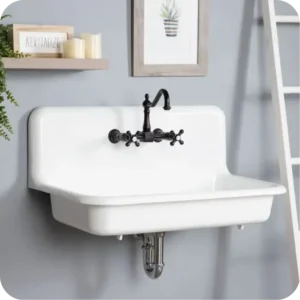
Cast iron sinks are incredibly durable and heat-resistant, making them ideal for heavy daily use. They often feature enamel coatings that enhance their aesthetic appeal and protect against scratches and stains. However, they are heavy and may require extra support during installation.
5. Glass
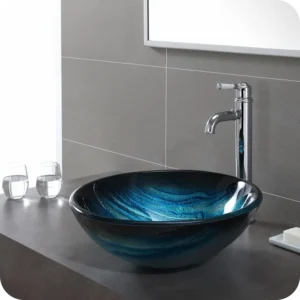
Glass sinks add a touch of elegance and modernity to any bathroom. They come in various colors and styles, allowing for creative customization. While visually stunning, glass sinks can be prone to chipping and scratching, and they require regular cleaning to maintain their clarity.
6. Natural Stone
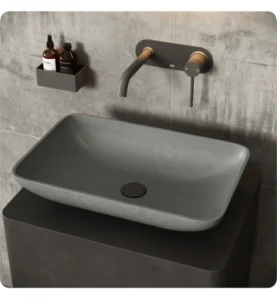
Natural stone sinks, such as granite or marble, exude luxury and sophistication. Each sink is unique, showcasing distinct patterns and colors from the natural material. However, they can be expensive and require regular sealing to prevent stains and damage from water exposure.
7. Copper

Copper sinks offer a rustic charm and warm patina that develops over time. They are antimicrobial, meaning they inhibit the growth of bacteria and germs. However, copper sinks can be prone to scratching and require special care to maintain their finish.
8. Solid Surface
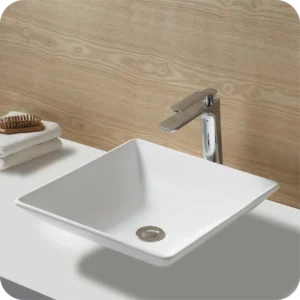
Solid surface sinks, made from materials like acrylic or resin, offer seamless integration with countertops for a sleek, modern look. They are non-porous, resistant to stains and bacteria, and easy to clean. However, they may not withstand high temperatures and can be prone to scratching.
9. Composite
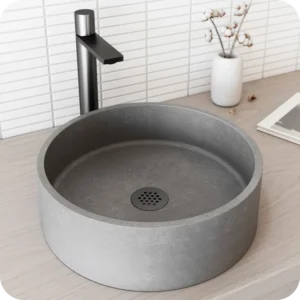
Composite sinks, crafted from a blend of materials like quartz or granite particles and resin, combine the best of both worlds: durability and aesthetics. They come in various colors and finishes, mimicking the appearance of natural stone without the associated maintenance requirements.
10. Concrete

Concrete sinks are gaining popularity for their customizable designs and industrial-chic appeal. They can be cast in various shapes and sizes, allowing for unique creations tailored to individual preferences. However, concrete sinks require regular sealing to prevent staining and water damage.
Conclusion
Choosing the best material for your bathroom sink is a decision that involves considering factors such as durability, maintenance, aesthetics, and budget. While each material offers its own set of advantages and drawbacks, there is no one-size-fits-all solution. Ultimately, the best choice depends on your personal preferences, lifestyle, and the overall design scheme of your bathroom.
Have questions about your next renovation project? We’ve got answers. Let’s do this together.
Follow House Beautiful on Instagram.
FAQs
Cast iron and stainless steel are among the most durable options, capable of withstanding heavy daily use.
Porcelain, ceramic, and solid surface sinks are known for their low-maintenance cleaning requirements.
While glass sinks can be more susceptible to chipping and scratching compared to other materials, they are still durable when properly cared for.
Yes, natural stone sinks like granite or marble require regular sealing to prevent stains and water damage.
Yes, copper sinks have natural antimicrobial properties that inhibit the growth of bacteria and germs.

